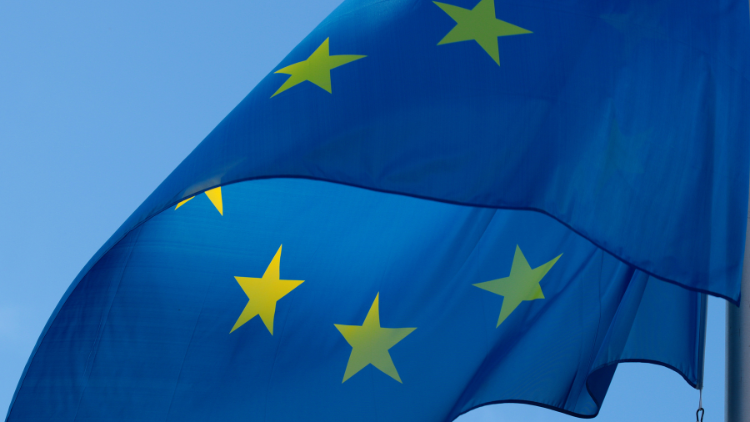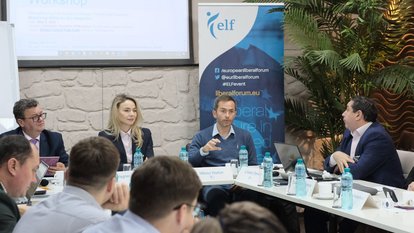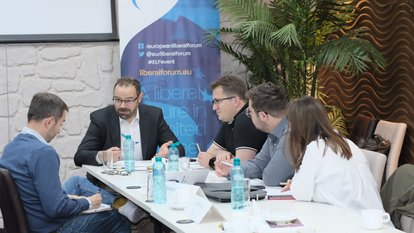Republic of Moldova
Civil Society in Eastern Europe Mobilises for EU Integration

Workshop "Consolidarea societății civile în țările Parteneriatului Estic: Mobilizarea ONG-urilor pentru integrarea în UE"
Representatives of civil society organisations from the Republic of Moldova and other countries of the Eastern Partnership and the European Union participated in a workshop held in Chisinau dedicated to strengthening civil society and mobilising for European integration. The event, held with the support of the European Liberal Forum (ELF) and the Friedrich Naumann Foundation for Freedom (FNF), provided a platform for dialogue and cooperation between actors involved in the European integration process.
The fact that this workshop was organised on Europe Day gave the event a special significance: on a day celebrating peace, unity and European values, civil society in the region not only reflected on the European journey, but also turned the symbol into concrete action, mobilising to build real bridges between communities, strengthen the resilience of NGOs and bring European integration closer to citizens.
The event was opened by Milosz Hodun, member of the ELF Board of Directors, who encouraged the exchange of experiences and ideas for promoting European integration in the Eastern Partnership countries. Raimar Wagner, project director for Romania and the Republic of Moldova at FNF, invited participants to reflect on increasing the resilience of CSOs and responding to legal restrictions, such as legislation on foreign agents.

Workshop-ul "Consolidarea societății civile în țările Parteneriatului Estic: Mobilizarea ONG-urilor pentru integrarea în UE"
The Republic of Moldova is currently undergoing bilateral screening with the European Commission in preparation for EU accession negotiations. The accession process involves aligning national legislation with the 33 chapters of the EU acquis, and the Republic of Moldova has made significant progress in 31 of these. The national objective is to prepare for accession to the European Union by 2030, with negotiations completed by 2028. A National Action Plan for EU Accession has been adopted, structured in 33 chapters and seven sections, which includes legislative and institutional measures.The process involves active consultation with civil society, and the authorities are seeking solutions to provide financial support.
The European Commission has welcomed Moldova's progress, and the next intergovernmental conference is scheduled for June this year. Moldova will receive €1.8 billion in financial support from the European Union, with strict monitoring of the use of funds.
In a dynamic panel discussion, experts from various EU Member States and candidate countries shared lessons on communicating European values. From the mobilisation of Polish society in 2003 to experiences in Slovakia with NGO networks and current challenges in Georgia, the common conclusion was that civil society plays an essential role in combating disinformation and promoting an inclusive narrative on European integration.

Un grup de lucru activ: cum formulezi strategii pentru comunicare eficientă?
In the first part of the workshop, representatives of Moldovan NGOs discussed current obstacles: Russia's information war, the politicised perception of the EU, lack of coordination between organisations and messages that are insufficiently tailored to the general public. Representatives from Armenia and Georgia highlighted external pressures, legal restrictions and political infiltration by pro-Russian forces, but also opportunities such as strengthening regional cooperation and increasing the EU's visibility in the region.
In the second part, participants identified solutions to strengthen civic support for accession. Raimar Wagner recalled the example of civic mobilisation in Romania after the Colectiv tragedy, emphasising the importance of solidarity and coordination. Working groups formulated strategies for effective communication, protecting CSOs and extending their impact in rural communities.
This event demonstrated that, despite the challenges, NGOs in the Eastern Partnership countries remain united in their efforts to promote democracy, the rule of law and European integration. The exchange of best practices and mutual support are becoming essential in a context where anti-European forces are stepping up their actions. Eastern Europe has a voice – and civil society is making it heard.
The workshop was part of a broader project dedicated to strengthening geopolitical security and resilience in the South Caucasus and Eastern Partnership countries, bringing together NGOs from Moldova, Ukraine, Armenia and Georgia to facilitate the exchange of experience with experts from EU Member States such as Poland, Romania, Slovakia, Hungary and Bulgaria. Participants were involved in practical activities on storytelling, the use of digital media and coalition building, with the aim of developing the skills needed to effectively promote European integration and absorb pre-accession funds.
The next event in this project will take place in Bucharest, where the main themes will be NGO resilience and coalition building. In autumn, the series of events will continue in Tbilisi, and the results and recommendations will be summarised in a public policy document to be presented at the final conference in Brussels, scheduled for 2026, where the role of civil society in the EU enlargement process and the consolidation of democracy in the region will be discussed.
